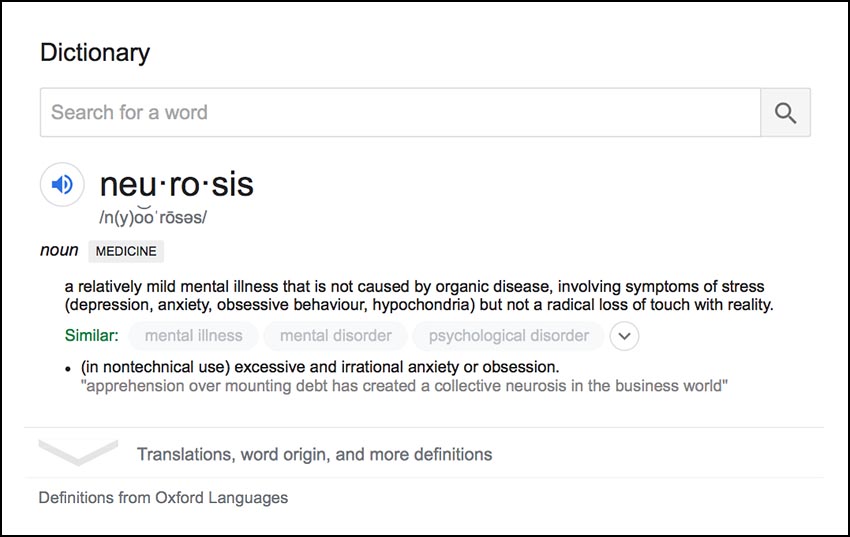Do you have a friend who gets overly angsty and easily frazzled in high-pressure situations? Or maybe a spouse who constantly suspects you of betrayal? If so, these might be signs of neurosis.
In popular culture, the term ‘neurosis’ often carries a light and humorous connotation. While calling someone neurotic might sound like a playful insult, it’s a more serious issue from a clinical perspective—and some scientists believe it warrants more attention than it receives. The negative temperament that characterizes neurotic behavior may play a role in anxiety and mood disorders. According to a study published in American Psychologist, neurosis may be a sign of more serious physical and mental disorders.
To better alleviate the health risks that accompany neurosis, it’s important that we embrace its serious side. This means understanding the meaning of neurosis, differentiating it from psychosis, learning the characteristics of neurotic behavior, and highlighting some ways to overcome the mental condition.
What Does Being Neurotic Really Mean?
“Define neurosis” Depending on your source, the term ‘neurosis’ has different meanings. For some psychologists, it refers to a personality trait. Others define neurosis as a spectrum of mental problems that fall outside the bracket of psychotic disorders. More commonly, doctors define neurotic behavior in relation to a patient’s anxiety symptoms. But what is the real meaning of neurosis? To answer this question, we look at the definition of neurosis over the centuries.
- William Kullen (1769): The Scottish physician is often credited as the first person to define neurosis. According to an article in the Cambridge Journal of Medical History, Dr. Kullen maintained that the condition is caused by an “affection of the nervous system” and it’s characterized by “disorder of sense and motion.”
- Sigmund Freud (1856-1939): Freud—the founder of psychoanalysis—theorized that neurosis is centered on psychic trauma/defense, sexual trauma, and repressed sexuality. The Australian neurologist defined neurotic behavior as attempts to cope with unsuccessfully repressed emotions stemming from experiences in the past. A good example is a phobia of dogs due to a dog attack in the past.
- Carl Gustav Jung (1875-1961): According to the Swiss founder of analytical psychology, neurosis is a conflict between two psychic events—unconscious and conscious events.
- Hans Jürgen Eysenck (1916-1997): As stated in an article appearing in the Journal of Personality and Individual Differences, The German-British psychologist defined neurosis as emotional instability.
Although these definitions differ, they have one thing in common. Neurosis is seen as an ailment or diagnosable psychological disorder—with causative factors and possible treatments. This was the generally accepted idea until a few decades ago (1980) when the term ‘neurosis’ was officially removed from the American Psychiatric Association’s Diagnostic and Statistical Manual of Mental Disorders (DSM-III).
Neurosis or Neuroticism?
The term neurosis is often used interchangeably with neuroticism. But contrary to popular opinion, the two terms are clinically different. According to an article published in The Encyclopedia of Clinical Psychologyby a researcher affiliated to the University of Virginia Health Science System, “Neurosis and neuroticism are related concepts that have very distinct definitions and evolutionary courses.”
Neuroticism is a personality trait, hence not a medically diagnosable disorder. It’s part of the “Big Five” personality trait model—along with Openness to Experience, Conscientiousness, Agreeableness, and Extroversion. It’s a tendency to be in an anxious or negative emotional state. People with neuroticism are sensitive to environmental stress and they tend to be shy and overly self-conscious.
Although this personality trait does not impair daily function—and it’s not usually a concern—it can make a person more susceptible to other physical and mental problems. An article in American Phycologistclaimed that “Neuroticism is a robust correlate and predictor of many different mental and physical disorders, comorbidity among them, and the frequency of mental and general health service use.” Additionally, a 2002 study of 3,929 individuals concluded that neuroticism may increase the risk of developing psychosis. With this in mind, what is the link/difference between neurosis, neuroticism, and psychosis?
Psychosis or Neurosis?
In recent years, there have been scientific debates regarding the distinction of psychosis and neurosis. Most of the discussions revolve around the link between the two mental disorders. Does neurosis lead to psychosis?
Unlike neurotic disorders, psychosis often involves a radical loss of touch with reality – i.e., emotional turbulence, hallucination, and delusions. Psychosis can be a symptom of severe mental problems such as a brain tumor, severe depression, bipolar disorder, or schizophrenia. It can also be triggered by prescription or illegal drugs and alcohol. In short, neurosis is milder than psychosis that does not interfere with a patient’s perception of reality.
Such is the close link between these two mental disorders that some patients are diagnosed with a borderline disorder—borrowing from the idea that there is a “borderline” between neurotic and psychotic symptoms.
Characteristics of Neurotic Behavior
Feeling anxious or having negative thoughts and phobias happens to all of us at some point in our lives. Stressing over finances, butterflies in your stomach before an important interview – these moments of worry are part of what makes us human. But when does such behavior and feelings become neurotic? Well, the common distinguishing factor is the intensity of thoughts and behaviors. According to Gregg Henriques, Ph.D. —a professor of psychology at James Madison University—neurotic patterns of behavior can be identified in 5 domains:
- Habits: Some habits such as hair-pulling, nail-biting, ritualistic cleaning, and alcohol binging are behaviors to temporarily alleviate anxiety.
- Emotions: Neurotic emotional patterns can either be hyper-sensitized feelings or suppressed feelings.
- Relations: Individuals who are constantly looking for signs of betrayal, fear control, or come out as too needy/dependent all portray neurotic relationship patterns.
- Defenses: The defenses we put up can be signs of neurosis. This includes rationalization (trying to hide our true feelings by making up reasons) and repressing (locking out) material from self-conscious recognition.
- Beliefs (verbal cognition): Do you believe that you’re unlovable or ineffective? Do you have extreme beliefs of how things should be if you’re to function? Trying to be perfect all the time? Or do you make catastrophic interpretations of otherwise trivial events?
It’s important to note that some people and more neurotic than others—the symptoms and risk factors can range from mild to dangerous. Interestingly, most people don’t even realize they’re neurotic. To determine whether you have signs of neurotic tendencies, consider the questions below:
- Are you irritable and constantly complaining about trivial issues?
- Do you have a tendency to stir up controversy and behave dramatically over minor incidents?
- Do you tend to respond negatively to otherwise neutral events?
- Are you often panicky in non-threatening situations?
- Do you wrongfully accuse your partner of betrayal or try to control them?
- Are you overly dependent on others or too clingy?
- Having obsessive thoughts, especially revolving around how you could have done something differently?
- Do you get distressed over issues that are typically considered minor?
- Are you often envious of others, including attempting to sabotage them?
If you can relate to a couple of these questions, there’s a chance that you may be portraying neurotic behavior. Of course, they can be harmless—or even helpful (as we will highlight later). Either way, recognizing where you stand is the first step towards recovery and promoting improved wellbeing for you and others.
A good example of someone who had neurotic characteristics was Isaac Newton. Regarded as one of the most influential scientists in history, Newton was by many accounts neurotic. For much of his life, Newton was protective of his privacy and deeply introverted. Historical records claim that he at times accused his friends of betrayal and conspiring against him. In an opinion paper, Adam M. Perkins from King’s College London suggests that Newton had a tendency to be consumed by negative thoughts. Neurotic individuals such as Newton are often overwhelmed by negative self-generated thoughts. Perkins goes on to say that these negative thoughts have a trickle-down effect that consequently affects their threat-processing systems.
The Upside to Neurosis
Neurosis may make you prone to disorders such as Generalized Anxiety Disorder (GAD), panic disorder, Post-Traumatic Stress Disorder (PTSD), social phobia, Obsessive-Compulsive Disorder (OCD), addiction, and depression. But that’s just one side of the narrative. In some cases, a healthy dose of neurosis can be good for you.
Take the example of Newton – the scientist is often quoted saying, “I keep the subject constantly before me…and wait till the first dawnings open slowly, by little and little, into a full and clear light.” This suggests that the genius and creativity of one of the greatest minds in history might have been rooted in his neurotic tendencies. By dwelling in past mistakes, he eventually found a breakthrough.
The neurotic feelings of self-consciousness, anxiety, worry, and obsessing over life stressors can drive someone to make defining decisions. Such individuals tend to be more realistic in their expectations and take fewer risks. Moreover, dwelling on negative thoughts means that the person is prepared for negative outcomes and they’re able to interpret perceived danger faster. For this reason, neurosis can be an advantage – but only if properly managed.
Diagnosis of Neurosis
As discussed earlier, the Diagnostic and Statistical Manual of Mental Disorders (DSM-III) no longer defines neurosis as a mental illness. For this reason, it’s no longer diagnosed as a disorder. Instead, healthcare professionals place the symptoms of neurosis within the categories of more specific disorders such as depression, obsessive-compulsive disorder, post-traumatic stress disorders, and anxiety disorder.
On the other hand, it’s possible to identify neuroticism with the use of personality tests. The higher the score, the lower the ability to deal with stress successfully, and the more emotionally unstable you are.
Managing Neurosis
The standard psychological care for neurotic individuals can include psychotherapy, cognitive behavioral therapy, creative therapy (e.g., art and music therapy), neurofeedback therapy, relaxation techniques (e.g., deep breathing and having enough sleep), and psychoactive drugs. Generally, overcoming neurosis focuses on curbing the negative behaviors and keeping them ‘less intense’. Below we provide some tips on how to personally deal with neurosis and how you can help a loved one with neurotic tendencies.
Self-Treatment
- Practice self-acceptance: Give yourself some credit, compassion, and love. Learn to accept that you’re doing the best you can—and some unfortunate conditions are part of life. Also accept other people’s capacity and the possibility of making mistakes.
- Be mindful: Take a step back and think about why you are experiencing the neurotic thoughts. Why are you so anxious? Why are you constantly seeking approval? This gives you a broader perspective of the issue and allows you to let go of the negative thoughts. You can also look out for patterns, track, and write down some common triggers for your neurotic tendencies.
- Cut back on alcohol and other negative coping habits: These are just temporary fixes to the anxiety—and they come with significant costs such as health problems.
- Share with someone: You’re not alone! Talk to some close friends and family about your symptoms and ask them to help you.
- Sleep it off: Ensure you have enough rest and sleep to help manage irritability, stress, and anxiety.
- Actively reframe your negative thoughts: Although this is easier said than done, attempt to replace your negative feelings and thoughts with more positive ones. Consider taking deep breathes to calm your temperament. This might make a situation less intense and help you realize that your reaction was not warranted.
How to Deal with Neurotic People
- Offer reassurance: If someone portrays neurotic behavior, never be judgmental or critical of their actions. Instead, reassure them that it’s something manageable.
- Have a Persuasive and positive conversation: In a study published in the Journal of Personality, the researchers looked at the behaviors of nearly 4,000 participants from 19 countries. The team—led by Molly E. Ireland—discovered that neurotic people have less positive attitudes towards tackling stressful events and taking action. For this reason, it’s important to be supportive and persuasive to someone experiencing these negative feelings. Gently convince them to take positive action.
- Distract/distance them from the negative emotions: Suggest deep breathing exercises, walks in the park, or any other activity to distance them from the negative neurotic thoughts. This gives them a chance to be more realistic and calmer.
- Ask them to seek professional help: If the methods above don’t seem to be working, it may be best to speak to a professional. Sometimes neurotic people need the help and nudge of a therapist, counselor, psychologist, psychiatrist, or other mental health professionals.
Key Takeaway
The meaning of neurosis is complex—with different definitions. Until recently, it was a diagnosable pathological condition characterized by relatively intense anxiety and obsessive thoughts. The terms ‘neurosis’ is often confused with neuroticism, which is an undiagnosable personality trait. This may be attributed to the declassification of neurosis as a mental disorder in the third edition of DSM IIIand the development of the ‘Big Five’ personality model.
Although it can negatively affect an individual’s quality of life and even increase the risk of psychosis, there’s a bright side to neurosis. Some sources associated it with high intelligence and creativity. Regardless of whether neurotic tendencies are beneficial or harmful, it’s important to manage them—both as the victim and as a spectator.






